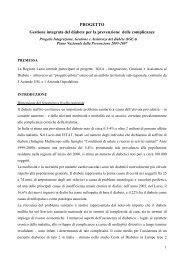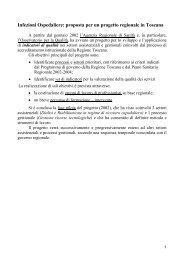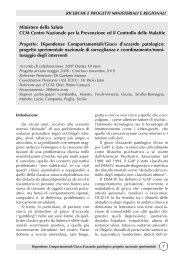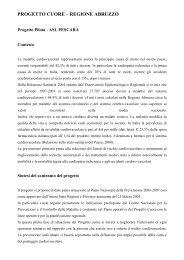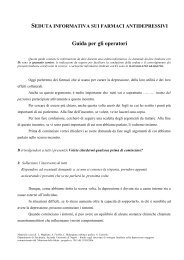Gaining health : analysis of policy development in European ...
Gaining health : analysis of policy development in European ...
Gaining health : analysis of policy development in European ...
You also want an ePaper? Increase the reach of your titles
YUMPU automatically turns print PDFs into web optimized ePapers that Google loves.
Chapter 5<br />
220<br />
opment needs longer-term plann<strong>in</strong>g and has less tangible<br />
short-term results. Where classical public <strong>health</strong> issues still<br />
prevail, and the general economic and social situation is not<br />
propitious, the time may be not ripe for governments to<br />
give priority to NCD <strong>policy</strong> <strong>development</strong>.<br />
The <strong>policy</strong> environment<br />
In a number <strong>of</strong> countries, a more general change <strong>in</strong> the<br />
<strong>policy</strong> environment converged with a recognition <strong>of</strong> the<br />
problem <strong>of</strong> NCD when the state’s responsibility for <strong>health</strong><br />
(and not just for <strong>health</strong> care) was clarified. This was re<strong>in</strong>forced<br />
<strong>in</strong> some cases through constitutional changes or<br />
public <strong>health</strong> legislation and presented an opportunity for<br />
br<strong>in</strong>g<strong>in</strong>g NCD higher on the <strong>policy</strong> agenda.<br />
When Lithuania rega<strong>in</strong>ed its <strong>in</strong>dependence, the political<br />
mood and urge to redef<strong>in</strong>e the national identity, together<br />
with the re-establishment <strong>of</strong> the Medical Association,<br />
<strong>of</strong>fered an opportunity for a radical reth<strong>in</strong>k<strong>in</strong>g <strong>of</strong> the approach<br />
to <strong>health</strong> <strong>policy</strong>. A number <strong>of</strong> countries used their<br />
entry to the <strong>European</strong> Community and/or their presidency<br />
<strong>of</strong> the EU to br<strong>in</strong>g NCD issues to the fore. For example,<br />
the French presidency <strong>of</strong> the EU was an important trigger<br />
<strong>in</strong> shap<strong>in</strong>g a new <strong>policy</strong> on nutrition and physical activity <strong>in</strong><br />
France, <strong>of</strong>fer<strong>in</strong>g political success and recognition.<br />
A special dilemma is the lack <strong>of</strong> an explicit NCD <strong>policy</strong> or a<br />
lack <strong>of</strong> decision-mak<strong>in</strong>g. In the WHO <strong>European</strong> Region, the<br />
explanation <strong>of</strong> such a phenomenon is usually not <strong>policy</strong>makers’<br />
lack <strong>of</strong> awareness <strong>of</strong> the issues. There are various<br />
reasons for a failure to promote NCD <strong>policy</strong>, <strong>in</strong>clud<strong>in</strong>g:<br />
• the lack <strong>of</strong> short-term political ga<strong>in</strong>;<br />
• concern regard<strong>in</strong>g the feasibility <strong>of</strong> chang<strong>in</strong>g lifestyles;<br />
• the fear <strong>of</strong> negative public reaction;<br />
• the lack <strong>of</strong> a “w<strong>in</strong>dow <strong>of</strong> opportunity”; and<br />
• the fact that many countries are fully occupied with the<br />
problems <strong>of</strong> <strong>health</strong> care f<strong>in</strong>anc<strong>in</strong>g, provid<strong>in</strong>g accessible<br />
and good-quality care, reduc<strong>in</strong>g wait<strong>in</strong>g lists and meet<strong>in</strong>g<br />
demands for new types <strong>of</strong> care.<br />
Key actors <strong>in</strong> the awareness-build<strong>in</strong>g process<br />
As clearly <strong>in</strong>dicated by the case studies, key <strong>in</strong>dividuals,<br />
advocacy groups and public op<strong>in</strong>ion can play an important<br />
role <strong>in</strong> awareness build<strong>in</strong>g.<br />
Politicians<br />
New presidents, prime m<strong>in</strong>isters and m<strong>in</strong>isters <strong>of</strong> <strong>health</strong><br />
may be powerful agenda-setters, s<strong>in</strong>ce the newness <strong>of</strong> their<br />
position allows them room for manoeuvre and new <strong>in</strong>itiatives.<br />
In Hungary at the beg<strong>in</strong>n<strong>in</strong>g <strong>of</strong> the 1980s, for <strong>in</strong>stance,<br />
a new Deputy Prime M<strong>in</strong>ister, with a medical background<br />
and <strong>in</strong>spired by the WHO Health for All <strong>policy</strong>, <strong>in</strong>itiated<br />
the process for develop<strong>in</strong>g a long-term <strong>health</strong> promotion<br />
strategy by position<strong>in</strong>g herself politically <strong>in</strong> favour <strong>of</strong> <strong>in</strong>tersectoral<br />
action. Four successive governments <strong>in</strong> Hungary<br />
developed new <strong>health</strong> policies under different labels,<br />
each attempt<strong>in</strong>g to create symbolic differences and a new<br />
identity compared to their predecessors. In Kyrgyzstan, the<br />
public <strong>health</strong> strategy Manas Taalimi can be clearly related<br />
to a change <strong>in</strong> government, a new M<strong>in</strong>ister <strong>of</strong> Health and a<br />
Deputy M<strong>in</strong>ister responsible for public <strong>health</strong>.<br />
Individual advocates or prime movers<br />
In all the study countries, certa<strong>in</strong> prime movers played an<br />
outstand<strong>in</strong>g role <strong>in</strong> <strong>in</strong>itiat<strong>in</strong>g the NCD <strong>policy</strong> <strong>development</strong><br />
process. The first generation <strong>of</strong> prime movers, a product<br />
<strong>of</strong> the late 1970s and 1980s, were deeply <strong>in</strong>volved <strong>in</strong> the<br />
first national/<strong>in</strong>ternational cardiovascular projects and the<br />
WHO Health for All movement and were pioneers <strong>in</strong> the<br />
Ottawa Charter. These people comb<strong>in</strong>ed a number <strong>of</strong> skills:<br />
a very high level <strong>of</strong> expertise, an open m<strong>in</strong>d, political and<br />
managerial ability, and a cooperative spirit. The role <strong>of</strong> such<br />
outstand<strong>in</strong>g personalities is clearly demonstrated <strong>in</strong> the<br />
case <strong>of</strong> <strong>policy</strong> <strong>development</strong> <strong>in</strong> F<strong>in</strong>land, Hungary, Ireland and<br />
Lithuania.<br />
Reflections on experiences




